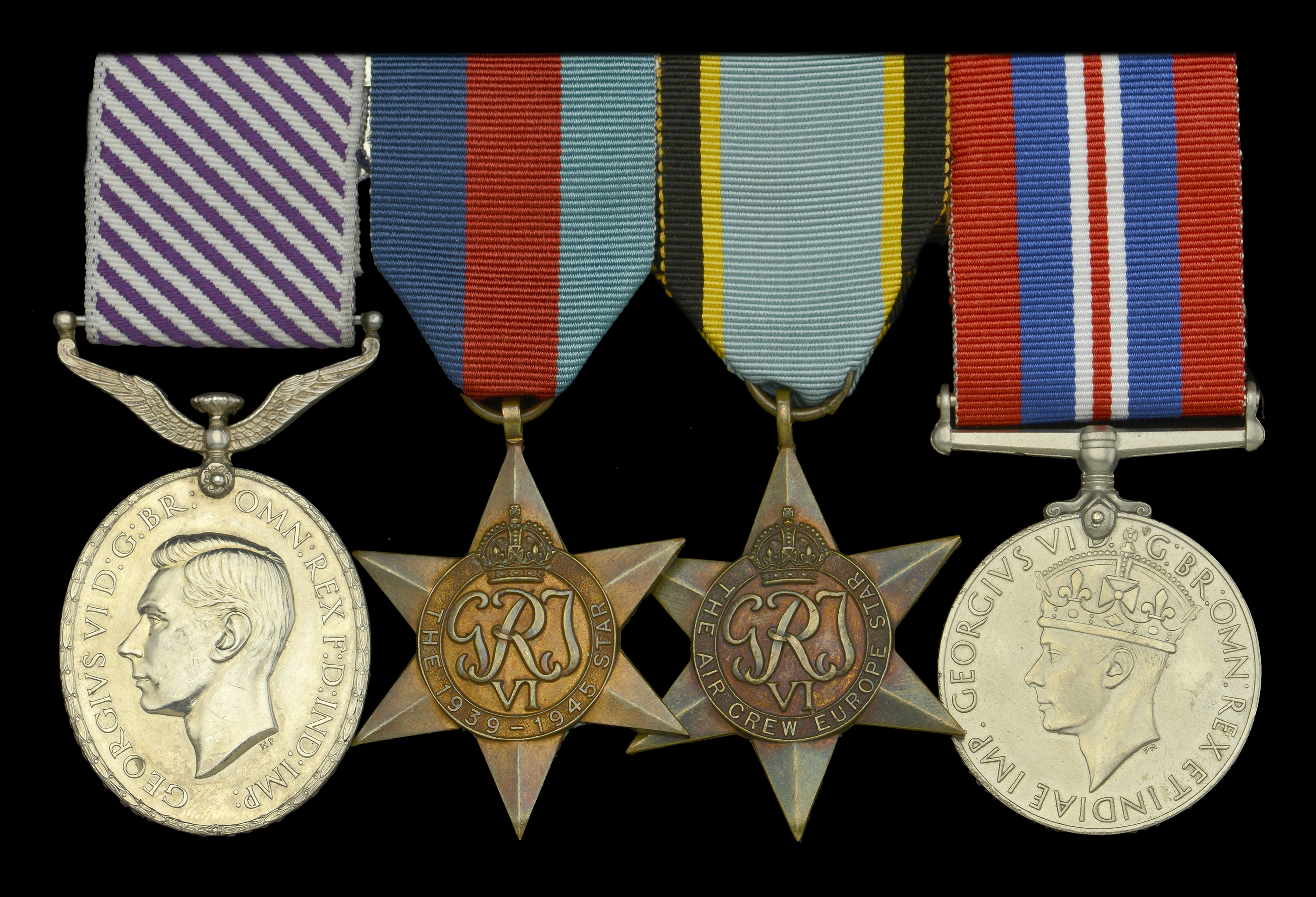A fine Second War Immediate D.F.M. awarded to Flight-Sergeant W. J. Rose, No. 207 Squadron, Royal Air Force Volunteer Reserve, whose Lancaster fended off three Arado Float planes when taking part in a daylight raid on Le Creusot on 17 October 1942; he was killed returning from a raid on Genoa just three weeks later Distinguished Flying Medal, G.VI.R. (778285. F/Sgt. W. J. Rose. R.A.F.); 1939-45 Star; Air Crew Europe Star; War Medal 1939-45, these last three all officially engraved ‘77825 F/Sgt. W. J. Rose. D.F.M. 207 Sqdn.’, as issued by the medal office in Salisbury, Rhodesia, mounted for display, very fine (4) £1,800-£2,200 --- D.F.M. London Gazette 20 November 1942. The recommendation for an immediate award states: ‘Flight Sergeant Rose was Navigator in Lancaster aircraft L.7583 when it was attacked by three Arado 196 float planes on 17th October, 1942, approximately 20 miles west of Brest. Despite the fierce engagement which was taking place and the fact the bullets were flashing through the aircraft, one of which killed the Flight Engineer, this N.C.O, with great calmness and courage, continued to carefully check his position. In addition to this, he made all arrangements to ensure that, in the event of the aircraft having to ditch in the sea, all possible aids would be ready and available and the exact position of the aircraft would be known. The calmness and quiet determination displayed by this N.C.O. when continuing his duties under most exacting conditions reflects on him the greatest credit.’ Remarks by A.O.C. ‘This Navigator, after the encounter referred to, showed considerable skill and resource in navigating the aircraft safely to Exeter in extremely bad weather conditions. Recommended for an immediate award of the Distinguished Flying Medal.’ William James Rose was born on 17 February 1919, at Melsetter, Southern Rhodesia, the son of William and Mary Rose of Melsetter. Joining the Royal Air Force Volunteer Reserve he was posted first to No. 50 Squadron before transferring to 44 Squadron on 24 April 1942, performing convoy duties with them from Portreath between July and August 1942. Rose joined No. 207 Squadron from there on 4 September 1942, joining the raid on Le Creusot - code-named ‘Operation Robinson' - just 13 days later. This attack on the Schneider Works in Le Creusot was undertaken by No. 5 group, including 207 Squadron, comprising 94 bombers. Fears over civilian casualties prevented a night-time raid so Wing Commander Leonard Slee instead planned a daring daylight strike. Taking off mid-afternoon on 17 October, with the intention of arriving in the early hours of the evening, the group covered 300 miles of French countryside at tree-top height. Arriving over Le Creusot at dusk they went in hard with most of the bombs being dropped within a seven-minute period. Rose's aircraft did not make it as far as the raid itself, having developed engine problems not long after take-off. The citation for the award of the D.F.M. - shared with five other members of the crew - takes up the story, stating: 'As navigator, pilot, wireless operator/gunner and rear gunner respectively, these airmen flew in an aircraft which took part in an attack on Le Creusot on 17th October, 1942. Shortly after taking off, engine trouble developed. Despite great efforts, Sergeant Wilson was unable to continue his mission and course was set for base. Near to the French coast, whilst flying at only 40 feet above the sea, the aircraft was attacked by three enemy float planes. In the face of a trying situation Sergeant Wilson displayed fine airmanship and, splendidly supported by his gunners whose skill destroyed two of them and drove off the third, he eventually flew the aircraft back to an aerodrome in this country. During the combat Flight Sergeant Rose coolly continued his duties and his subsequent navigation was of the greatest assistance to his pilot. Throughout, this crew displayed great courage, high skill and perfect teamwork.' Rose was awarded the D.F.M. for his actions but tragically his laurels were not to last for long. The Allies initiated an area-bombing campaign against Genoa in October 1942, launching massive attacks with the fourth of these scheduled for the night of 7-8 November and including 207 Squadron. This was to prove the heaviest raid the city faced during the War, when 143 aircraft dropped 237 tonnes of bombs. Rose's Lancaster I L7546, took off from Langer at 18:01 and made the raid but crashed during the return flight at Champignol-Lez-Mondeville. It is not known whether this was due to damage taken in the raid, pilot error or enemy action; however, the result was all seven members of crew killed. Rose is buried at Champignol-Lez-Mondeville Churchyard, France. Sold together with copied research including a ‘Bomber Command - Losses Database’ transcription, recommendation for award and Graves Registration document along with a Commonwealth War Graves listing.





